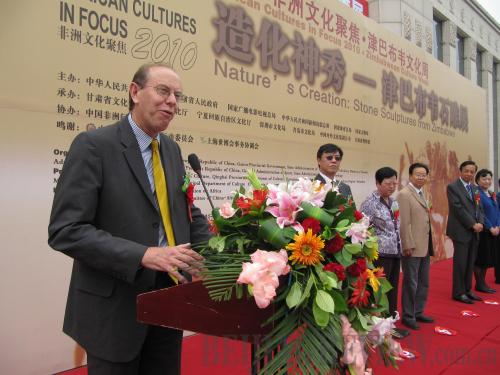|
 |
|
David Coltart, Zimbabwe's Minister of Education, Sports, Arts and Culture spoke at the opening ceremony of "African Cultures in Focus 2010: Zimbabwe Culture Week"in Lanzhou (LIU JIAN) |
This year marks the 30th anniversary of Sino-Zimbabwean diplomatic relations. In celebration, between August 12 and 19, "African Cultures in Focus 2010: Zimbabwe Culture Week" was held in Lanzhou, Gansu Province. Activities included a Zimbabwean stone sculpture exhibit and dance showcase. David Coltart, Zimbabwe's Minister of Education, Sports, Arts and Culture, spoke to ChinAfrica reporter Liu Jian about his ministry's efforts to rebrand the country.
ChinAfrica: One of the goals of the new transitional government from February 2009 is to create a new, positive brand for Zimbabwe. Why?
David Coltart: Zimbabwe may not be such a negative brand in China, but it has become a very negative brand in the West because of the political turmoil [of] the past 10 years, which has been associated with racism and violence. Of course, it's not all Zimbabwe is about. You have to explore ways in which you can portray a new image of Zimbabwe.
How is your ministry involved in this process?
I see education, sports, arts and culture [playing] a critically important role in rebranding our nation. Through our sportsmen and women, through our artists, I believe that we can do it in a very positive way. We've got a small population – only 12 million Zimbabweans. Yet that small population generates top [talent].
One of the things we are doing is identifying [those] who have excelled. We see them as cultural or sporting or artistic ambassadors for Zimbabwe. When you take them to other nations, they inspire and change the thinking of the people [to] associate [that] talent – ability – with the nation. They can do a lot more than politicians, often.
How does globalization affect Zimbabwean traditional art, especially sculpture?
We are world leader in stone sculpture, [but] one of the problems we [have] is [that] some of our art has been commercialized, and has become routine and predictable. The push of the Western market can lead to [an assembly] line of artistic productions, which loses some of the essence of Shona sculpture.
What is being done to protect and develop Zimbabwe's traditional arts?
The most important thing we have to do is to make sure that there is a transfer of the knowledge from the old masters to the young generation. But we have major challenges. Culture and arts are terribly underfunded in Zimbabwe. One of my concerns as a minister is that there's no structured program. [Right now] it is done very much in an ad-hoc fashion.
What would you say is your most challenging task?
In the last 10 years of political turmoil, our economy almost collapsed totally. We had [a] period of hyperinflation and no longer have [a] currency. [Now we] are trying to rebuild our economy. To give you some idea of how serious it is, I am responsible for primary and secondary education of 3 million children, promotion of sports, arts and culture, and my total budget this year is $36 million. If you just take education, that equates to $1 per child per month. So, we have hardly any money unfortunately to allocate [toward] the promotion of sports, arts and culture.
What are your plans for cultural exchanges between Zimbabwe and China?
This year we signed a further chapter of our agreement between China and Zimbabwe. But our situation does limit what plans we can make until our economy picks up. What I have discussed is [getting] certain Chinese groups to Zimbabwe. We have a wonderful Harare International Festival of the Arts every year in April and May. For the last few years, there have been artistic groups coming from China.
What I discussed with China's Vice Minister [of Culture] today, was what we should look at to save money. What I have in mind is finding money to bring highly talented individual artists to perform alongside Chinese groups. When our economy picks up, then I think we will be able to look at much more extensive exchanges [with larger groups].
What's the image of China among ordinary Zimbabweans?
Part of the problem is that China is a long way away, and very few Zimbabweans have traveled to China. I think many Zimbabweans have a picture of China [from] over 30 years ago, of a much more closed society than it is now. So, that's one of the challenges we have to explain to Zimbabweans, that actually China is a very different country. The positive side is that Zimbabweans recognize the sense of cooperation [between Zimbabwe and China].
One [issue] that I raised with your Minister of Culture is my desire to see Chinese language, culture and history taught more. One of the programs I've initiated is to select certain schools to teach certain languages. I've approached the Chinese Government to come and help us rehabilitate one school in Zimbabwe, which will teach Chinese language, culture and history to secondary school students.
What's your impression of China from this trip?
What impresses me most is the sense of energy in China, the sense of an ancient land with deep-rooted culture. We've got a lot to learn from that. Zimbabwe is a relatively young nation; we do not have a recorded history that goes back centuries. China has been through a lot of turmoil for many centuries. But as a nation, you have survived, which gives us [Zimbabweans] hope for the future.
|